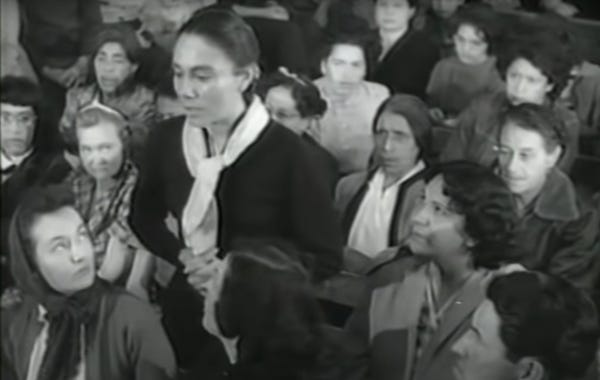Wonkette Labor Day Weekend Movie Party: 1954's 'Salt of the Earth'
I want to rise and push everything up as I go.
A version of this post was first published on September 6, 2020.
It's Labor Day! And while I could go on and on about Grover Cleveland's erasure of the radical roots of the holiday, I'm not gonna do that and we're gonna watch a movie instead. Fun!
So get out your popcorn and your red card because we're going to watch, and talk a little about, 1954's Salt of the Earth — the only movie blacklisted during Hollywood's red scare. It is a public domain film so it's totally free on YouTube and elsewhere.
The film, based on the 1951 Empire Zinc Strike in Grant County, New Mexico, was directed by Herbert Biberman, one of the Hollywood Ten (writers and directors who refused to name names in front of the House Un-American Activities Committee and were blacklisted as communists), written by Michael Wilson and produced by Paul Jarrico, both of whom were also blacklisted as communists.
Its star was the extremely cool Mexican actress Rosaura Revueltas, who was named best actress by the Académie du cinéma de Paris for her role as Esperanza Quintero. Revueltas was not only blacklisted as a communist, but she was deported back to Mexico during the making of the film and had to be replaced with a body double. Prior to making Salt of the Earth , she acted in Muchachas de uniforme (the Mexican remake of the German film Madchen in Uniform ), which enraged the Catholic church due to its sympathetic portrayal of a lesbian relationship. After getting deported, she moved to East Germany to work with Bertolt Brecht, because again, she was extremely cool.
Juan Chacón, who plays Revueltas husband Ramon Quintero in the movie, was not an actor but an actual labor leader in the actual Empire Zinc Strike.
What makes Salt of the Earth so relevant now was that it was not just the story of a labor strike. It also addressed racism within the labor movement. In one scene, a white labor leader tells Ramon, who tells him the Mexican miners want the same pay and same conditions as the white workers, that "Equality's the one thing the bosses can't afford. The biggest club they have over the Anglo workers is 'Well, at least you get more than the Mexicans.'"
It is also an explicitly feminist film — probably the most impressive thing for a 1954 movie that was written, directed and produced by men. The women in the film demand that their issues be taken up with the workers issues during the strike — their need for things like indoor plumbing and hot water in the company-owned housing they live in. And when the strike is kneecapped by the Taft-Hartley Act, the women take the lead and keep protesting, while fighting to be treated as equals in their own homes.
One of the major themes of the film is the need people have to be "better" than someone else, to not be at the bottom. The need of the Anglo workers to feel superior to the Mexican workers. The need of the men to feel like at least they're better than their wives. This leads to a confrontation between the Quinteros in which Esperanza tells her husband that he's treating her the way the Anglo bosses treat him.
Why are you so afraid to have me as your friend? […] Have you learned nothing from this strike? Why are you afraid to have me at your side? Do you still think you can have dignity only if I have none?[…] The Anglo bosses look down on you, and you hate them for it. 'Stay in your place, you dirty Mexican,' that's what they tell you. But why must you say to me 'Stay in your place?' Do you feel better having someone lower than you? […] Whose neck shall I stand on to make me feel superior? And what will I have out of it? I don't want anything lower than me. I am low enough already. I want to rise and push everything up as I go.
She then tells him he can't win anything without her, and he goes to slap her and she looks at him and says, "That would be the old way. Never try to hit me again. Never." This was a pretty big deal as domestic violence was not exactly a thing that came up in a lot of 1950s media (and when it did, it was rarely treated as an actual bad thing ).
The acting — because, in the neorealist style, many of the actors are not actors, but actual union workers — is admittedly not always super great. But there is so much that is good and extremely on point here — so it's worth a watch if you haven't seen it yet.
Salt Of The Earth (1954) www.youtube.com
Do your Amazon shopping through this link, because reasons .
Wonkette is independent and fully funded by readers like you. Click below to tip us!




It's an insanely useful concept.
fwiw, the Pumpkin soups I've had have been savory rather than pumpkin-spicey, but yes on the muffins! And also, when I make applesauce, a bit goes in there.